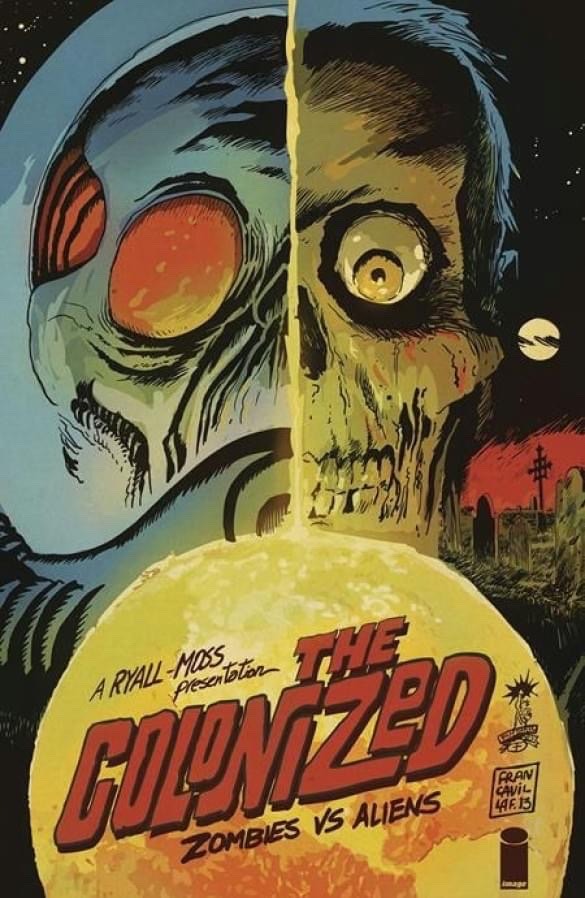#the colonized
Explore tagged Tumblr posts
Text
Like halfway through "how Europe underdeveloped Africa" cause I decided I'd read/listen to it after I had a strong base on knowledge on African history and just holy fuck is he right about nearly everything so far.
Having learned about how extensive African trade was prior to the 18th century and how heavily most African kingdoms shifted in the 16th it's very clear that what he points out in the way the slave trade and the need to aquire firearms grew the European economies while near completely emptying out African economies and how the hard shift to European import goods after Europe had grow through the use of African slave labor and monopoly of trade routes is still a largely still at play in the era of neocolonialism.
The way that Walter Rodney not just points out that this is true, but the depth to which he covers a variety of African kingdoms, their economies, and cultural practices puts even some college level courses to shame while also showcasing the exact ways in which some of these stronger or more expansive kingdoms like the Ashanti, oyo, borno, Kongo, and Benin kingdoms had explicitly tried everything to get guns through any other trade and how the Ashanti, merina, Ethiopian, Burundi Benin kingdoms sought our education and scholars to begin industrialization and the systematic way in which Europeans and Americans prevented that is just, well it's damming.
It's a continuing reminder how from the first stage of European expansion and control they had precisely zero good intentions for the peoples of Africa. That Europe saw Africa as nothing more than a way to grow itself, it's institutions and improve its economies by depriving Africa of labor, materials and freedom which is true to this day, most starkly in the Congo but true across the whole region.
But while the book shows the crimes of Europeans without sugar coating, it also doesn't glorify the African leaders and more importantly those that became collaborative with European despitism. It also does not abide by the word games the European powers like to play and goes in depth to the way Europeans had no actual interest in ending slavery, and that while invading the various kingdoms and communities to "end slavery" the created some of the most brutal slave conditions on this side of the globe, not just in Leopolds Congo but in French forced labor camps and British controlled regions, with the Portuguese being particularly up front about it.
Truly a shame that like most other black radicals Rodney was murdered so young. The rarity to which black radicals even get to 40 shows how desperately capitalist and white supremist try to prevent even the slightest push back from black voices. It also makes clear how much we all need to know this stuff, from debois's black reconstruction to nkrumah's neoimperialism these books give a great understanding of the past and the precise way in which we arrived to the current situation.
I pray that with the new scramble for Africa that is unfolding in front of our very faces, the genocides in the Congo, and Sudan, and the way in which these interlock with the genocide of Palestinians, that we all take the time to properly read and reflect so that we may properly organize and fight back for a fully free and sovereign Africa and Palestine and a world free from white supremacy.
#black liberation#colonization#politics#indigenous liberation#world of the oppressed#pan african#the colonized#How Europe underdeveloped Africa#walter rodney
671 notes
·
View notes
Text
The thing about the broadly left-of-center in the United States that I find striking in this moment is the conceit that they did literally everything they could and it didn't work, and this just proves the United States is worse than they ever imagined
I suspect this is one of the main problems with their strategy. They cannot pretend not to hate the United States long enough to make it stick. Every time they try, it is immediately recognized for the lie that it is, and then when their lie fails to catch, the mask then drops immediately, and they revert back to their miserable and bitter selves
#and look#there is no leftism writ large without the fundamental denial of reality#at its root leftism is hatred of existence itself#because it cannot tolerate imperfection#and the world as we have it is imperfect#they keep building these castles in the air#this mythical world where the proletariat--however defined--finally rises up#if only the poor would unite#if only the dispossessed#the colonized#the nonwhite#the women#whoever it is#or whatever combination#it's just not a reflection of reality
34 notes
·
View notes
Text
Not me comparing the Percy Jackson show and the live action ATLA 🫣
#percy jackson#live action#avatar the last airbender#on the concept of strength and anger#on missing the fucking point#and assimilation!!!!#weeeeee#the colonized#and the colonizers
3 notes
·
View notes
Text
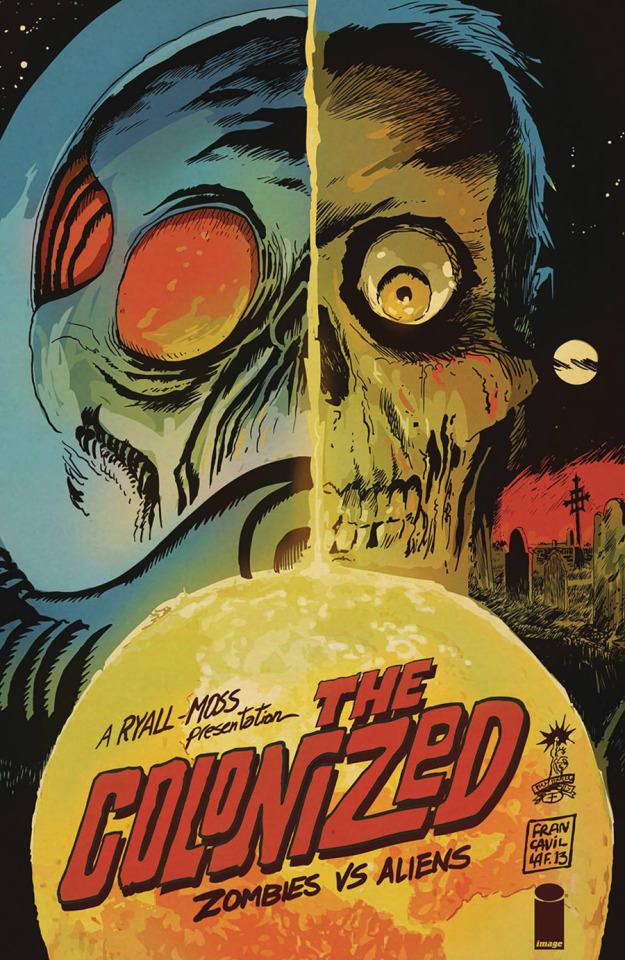
Out this week: The Colonized: Zombies vs. Aliens (Image, $9.99):
An off-the-grid community gets caught between a visiting alien and the zombies he accidentally resurrects in this comic by Chris Ryall and Drew Moss.
See what else is coming to a comic shop near you this week.
#can't wait for comics#new comic book day#comic books#comics#ncbd#new comics day#new comics#new comics wednesday#the colonized#chris ryall#drew moss#francesco francavilla
2 notes
·
View notes
Text
Hi everyone! Here's your Daily Reminder to Click for Palestine!
And if you can spare a dollar, donate to ANERA!
#arab.org#UNWRA#daily reminder#pro palestine#Palestine#gaza strip#Palestine Will Be Free#palestine israel conflict#help palestine#support palestine#ceasefire now#haza strip#from the river to the sea palestine will be free#don't stop talking about palestine#help gaza#anti zionism#israeli occupation#end israel's genocide#freedom for Palestine#free gaza#Free Palestine#jerusalem#no more war#end occupation#End the occupation#colonization#make a difference#how to help#humanitarian aid#humanitarian crisis
32K notes
·
View notes
Text
The US Military in Hawaii
25K notes
·
View notes
Text
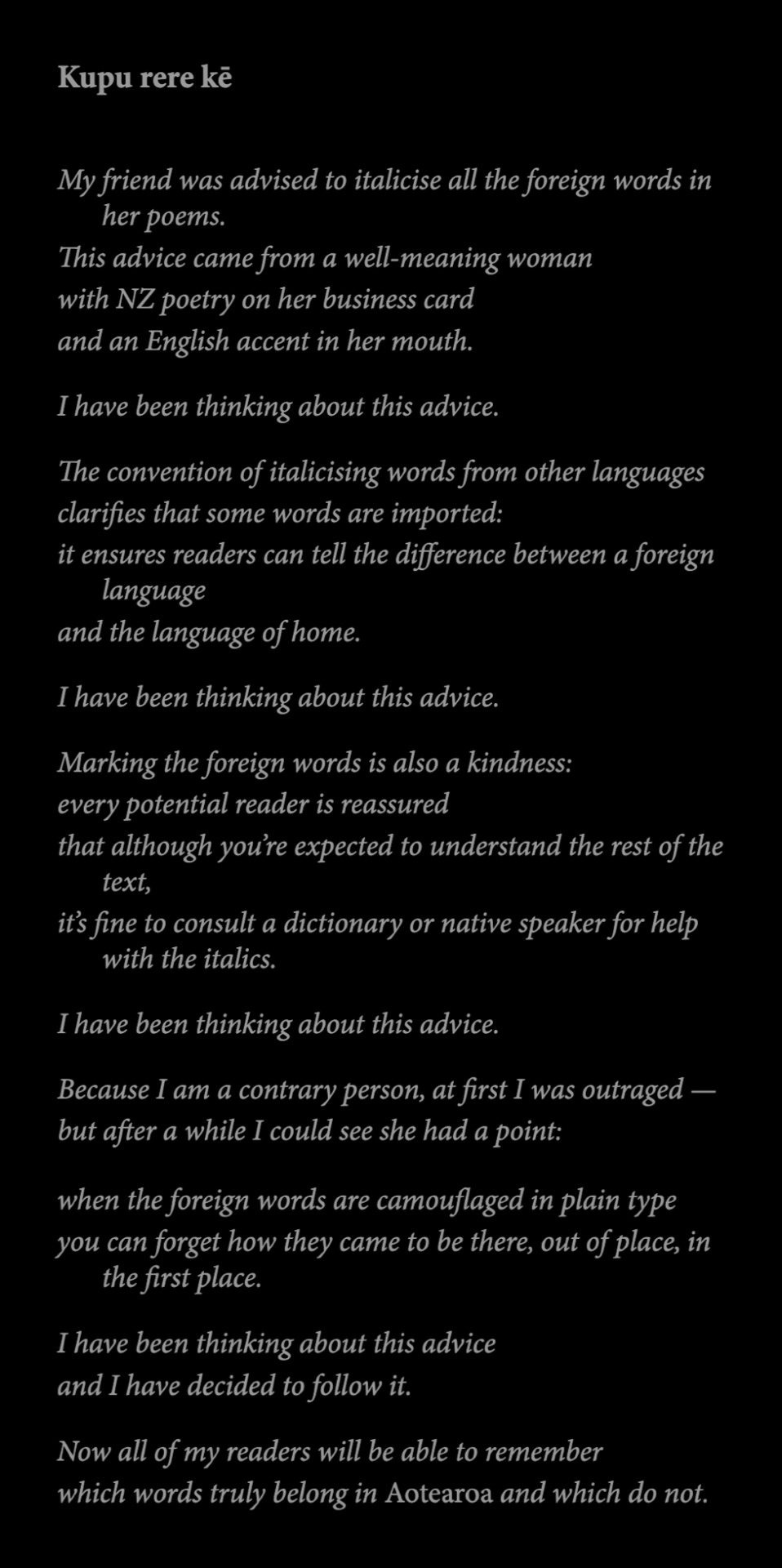
Alice Te Punga Somerville, Always Italicise: How to Write While Colonised - Kupu rere kē
[ID: A poem titled: Kupu rere kē. [in italics] My friend was advised to italicise all the foreign words in her poems. This advice came from a well-meaning woman with NZ poetry on her business card and an English accent in her mouth. I have been thinking about this advice. The convention of italicising words from other languages clarifies that some words are imported: it ensures readers can tell the difference between a foreign language and the language of home. I have been thinking about this advice. Marking the foreign words is also a kindness: every potential reader is reassured that although you're expected to understand the rest of the text, it's fine to consult a dictionary or native speaker for help with the italics. I have been thinking about this advice. Because I am a contrary person, at first I was outraged — but after a while I could see she had a point: when the foreign words are camouflaged in plain type you can forget how they came to be there, out of place, in the first place. I have been thinking about this advice and I have decided to follow it. Now all of my readers will be able to remember which words truly belong in -[end italics]- Aotearoa -[italics]- and which do not.
Next image is the futurama meme: to shreds you say...]
(Image ID by @bisexualshakespeare)

#powerful right off the bat#Alice Te Punga Somerville#Always Italicise#Always Italicise: How to Write While Colonised#new zealand poem#Always Italicise How to Write While Colonised#Kupu rere kē#aotearoa#quote#quotes#poem#poetry#Māori poetry#Māori#colonization#colonisation#Decolonisation#Te reo māori#Decolonization#new zealand#new zealand poetry
79K notes
·
View notes
Text
How Europe underdeveloped Africa and its legacy
first and formost before i break this down, this is not a post for white people to express their guilt, or savoir complex or love of historical revisionism. you'll not just be blocked, you'll go on a block list on this post, don't do it to yourself, i wont even have to be the one to do it. secondly this is a covering of the broad themes, lessons, and understanding within the book and what we should learn from it. third, i will often talk from my own perspective from which i will round to a larger context.
part 1- history and anthropology
As someone who has grown up black in the us, i grew up with a particular understanding or idea of Africa, the slave trade and the way America and Europe came about. you hear about tribal or ethnic disputes in the context of modern Africa and hear quite a lot of blatantly racist things about Africans. which caused me to get very into history, to which you learn when it comes to Africa there's not a lot of great places to start. this is something quite similar to the various indigenous peoples of the Americas as well. this has always been presented to me as a fault of Africans for not having history and is a long standing idea of white intellectuals from the 1800s to the Joe every man of today. the truth is Africa has history, there's no land, that has no history and Europe just devalues histories not associated with itself. there's a absolute glut of kingdoms, empires, languages, historical traditions, governing styles, cultural roles, trade networks etc etc. the fact of the matter is, that there's just very little Europeans want to learn about Africa that isn't to colonial ends, even today.
This is something Walter covers in great detail, to such a point that even as someone that has been purposely elbows deep into listening to everything i can find on African history i still had to go look up various pre-colonial kingdoms and figures. there is not a region of Africa that he doesn't take time to address in at least some detail, from Oyo and Ashanti on the west African coast, to the north of the Maghreb with Morocco and Algeria, east to the great lakes region, the horn of africa and south to the Zulus, koi koi, and Nguni peoples and kingdoms. The extensiveness to which he covers material forms of production, trade, and methods of historical preservation of culture, the types and breath of items, created and traded all through like cloth, glass, iron working, artistic ventures like bronze sculptures of benin and food production and cultization and the formations of various styles of rule, early democracy, and other such information put to bed nearly all of the non-nonsensical ideas that africa was a grand continent without progress, innovation, or skills and everything great, large, or more complex than rubbing to sticks together came from europe or arabs.
The book delves quite deep into the mythology of intense african slavery and violence which would be later used by europeans to justify colonization of africa to each other, said colonization, i will swing around back to much as the book does.
The middle passage, the triangle trade, the atlantic slave trade, these are all names for the event that was one of the chief reason to the economic and scientific take off of europe that would lead to industrialism, with the other being the colonization of the americans. stolen land and labor pushed the european world from not much a concern to anyone but those who had to deal with the crusades to the paramount power that controlled nearly all the sea trade, and held large swaths of territories of the world. we all know most of that, but walter ask the question on the other side of that coin. what did the slave trade do to africa? and why did they participate? the short answer is it changed the entire way african economies functioned and lessened the possibility of growth not just of kingdoms over territories, but of production and developement of sectors such as iron working, glass making, and agriculture. and in a very literal sense was one of the earliest forms of the phenomenon known today as brain drain and depopulation. we quite literally will never know the amount of people stolen or killed for slavery, we only know that as the rest of the world experienced high population growth africa and the americas started to experience intense depopulation. these phenomena weren't incidental they were known, and admitted as purposeful by figures qouted in the book. The african leaders at the time how ever were stuck between a rock and a hard place, many noted not just the importance of guns, but also recognized the importance of population growth at the onset. the game however being rigged from the start would have taken a miracle to over come. japan was the one country to escape colonialism in most meaningful senses, and that was because the dutch taught them how to produce guns and would trade with them "almost" as equals. these are also things addressed by rodney, the sale of arms was often highly lopsided, with Portugal and dutch traders only being willing to trade badly produced or broken guns, low quality powder and shot for slaves. this would not change until europeans would learn of other african products that they could make us of in their markets as raw materials such as ivory or kola nuts, this change would not happen for quite a while and mainly after the Europeans had already built their industrial bases and had taken total control of trade routes and begun to flood African markets with "cheap" products. the combinations of factors both purposeful and accidental shifted the African economies into a near total reliance on Europe economically and militarily but not yet politically. these are all expertly researched and explained to a point it is nearly impossible to refute any points. This points are all also something i can confirm from nearly every single source that ive looked into on African history.
part 2 -colonial "development"
This is a portion of history ill admit to doing my best to stay away from, generally much of my knowledge on it till this book has been on what happened with various kingdoms that fell in the late 1800s and early 1900s or by the various oral and 3rd hand accounts of what peoples familes, parents and even political elites went through. ill be frank, i did not go into the depth of the horrors of what happened with slavery, slave raiding, and its secondary effects, for this section and the next ill have to go through quite a lot. ill try to tone it down as best as i can, but on some of it even the implied parts are going to be horrid. I believe it is however important to face those head on, to truly understand the so called "white mans burden" or the reality of what that meant was.
colonialism meant making the final step, taking africa politically and physically. europe made the leap whole heartly to take all of africa, land, people, and any potential valuables, resources and to exploit everything they could get their hands on to the fullest extent possible. i do not use anything in the prior sentence lightly. Europeans like to play word games and often, the idea that they ended slavery in any meaningful sense is false, and ill come back to that in the final section. during the period of colonial control europeans destroyed just about anything of the prior rulers they could, and stole anything they could. theres a likelihood in my mind that theres many and african sculpture, painting, and cloth or glass work that sits in the home of a collector that got rich off the stolen plunder of africa. these includes many villages, cities, and palaces and shires and places of worship and places of craft. whole cities were destroyed such as kumasi, taking with it histories, architectural stylings and methods of production.
during this period was the final shift from internal political and economic growth to purely serving the empires to which ones lands belonged. no longer would rulers push for education reforms or challenges on religious bodies to strengthen any part of the nation, it was a total transformation into a form of state slavery. this is as metaphorical as literal, europeans would begin to change agriculture to be primarily centered around cash crops and mining labor to which labor was forced. people were made to pay taxes in the modern sense through the wages made through said labor. these taxes were in turn used primarily to fund the upkeep of oppressive forces and funding the check books of colonial governors, an insanely tiny portion of these funds were used for anything besides extracting wealth and resources.
the various governments put little to no money, research, or development into anything but cash crops and pulling things out the ground. the only times they put money into schools, training or even medical resources for people in African, it was for better wealth extraction and always the bare minimum. i believe (don't have the book in front of me rn) west Africa (from west of chad and south of Algeria) only had one university until the late 50s. the industrial sector of Africa was near completely killed, Africans in settler areas were not allowed to own even small scale industrial machinery such as cotton gins or fruit oil extraction machines, in non-settler state areas generally only peoples brought into Africa for the purpose of being a separated class of petite boug representatives for the colonizers were allowed to own industrial machinery. electricity was mostly for those same classes of individuals, hospital access, education access, pretty much anything you need for a community to survive esp in the modern era was highly restricted from Africans. To say that Europe "developed" Africa in any sense is beyond a bold faced lie, and it was something ,Rodney points out, that Europeans were quite proud of until they started to face push back for the level of humanity and exploitation they were facing. Once they started to get pushed out they changed their tune to the lie of African development and modernization. just like the lie of ending slavery for moral reasons and invading Africa to end slavery. Speaking of ending slavery in Africa, Rodney points to several figures who openly gloated about how they ran their colonial post or corporate holdings as slave plantations. king Leopold is one of the more famous examples of it, but far from the only one, many took delight in their cruelty. famine became endemic in regions that were the origins of many foods and cultivates crops, as all the agricultural process that could be shifted to cash crops were. Roads and trains ran from the mines and plantations to the seas and very little else. Various things needed to export raw materials were built with slave labor, like a airport in Kenya built by hand, no machinery via forced labor of Kikuyu peoples
Europe's only goal in Africa was land and profits, the same as in the Americas. genocide, slavery, starvation campaigns were common tools of colonizers in Africa all the way up to today, which i will re-address in part 4.
part 3 - education, traditional and political
Education is a very clear and important part of modern life, but also for building a nation, and self dependence, so it is of no wonder than colonizers thought that it should be restricted in Africa in regards to Africans. The various quotes and framing that Europeans used to dismiss the idea that Africans should have access to any form of formal education sounds exactly like quotes pulled from the most vicious of slavers of the prior centuries in the US and Haiti. One of the most prominent ideas that was education would "spoil" Africans, was a sentiment was also expressed by slavers. this section of the book is very much facts and figures on just how little access to education there was, how little funding went into it vs the amount of profits coming out of the various regions as well as how this was over come. two of the prime ways that was done according to the book and much of what Ive heard prior, was through the use of missionary schools or independent schools. These schools were primarily funded not by the colonial governments but by the peoples seeking education, their families, and so on, with the expectation that those educated would teach the rest of the family. education how ever was shown to not really pull people out of poverty nor to really give African peoples the possibility of positions of power or influence. this was such a near universally a rule, Amilcar Cabral, revolutionary leader and agricultural engineer even spoke to his personal experiences with being educated far beyond the man in charge of him yet having zero say in his job, his boss was renownly a dumb man. This was not an uncommon thing. Rodney goes well into it, and this just exemplifies how Europeans only saw Africans as a source of cheap and "unskilled labor". Access to education even if funded by the peoples seeking education themselves was clamped down on sharply once revolution was on the wind. Those who know the patterns of history though would have known that the clamping down made that worse, it simply accelerated the wants for education, as well as for independence.
part 4 - modern Africa and modern euro/america
When the cards started to fold on empire they took many different routes to lessen the fall for power, France tried blowing thing up and killing cattle and destroying things needed for civil life, a all call for genocide against Algerians. Britian, Portugal, most of them tried the same things, but they were pushed out in some ways, and when that became obvious they turned to the small group of political insiders they rapidly trained to take over in their stead. for those that weren't under the control of the colonizers they turned to the coup and military dictatorship. very few of the revolutionary leaders of africa were able to stay in power, many turned toward methods some would call authoritarian. without the context of what was going on and how unstable the situation was for these leaders and just how quickly and violently these revolutions could be overturned, it would be easy to take these figures as just becoming despots without reason, some of them really did become despots who just started functioning as neocolonial cops. This brings us to the modern era, and the current method of colonialism not just in africa but much of the world, Neocolonialism, or as i like to call it "home rule".
European nations were not ready to give up control, but they decided they would be willing to give up the appearance of direct rule. economic decisions, the political direction of countries, borders, very little of the modern africans situation was not directly decided on by europeans or americans. financial institutions such as the world bank and IMF lend these governments that had to try and start building actual nations with functioning economies loans with interest rates they would not be able to pay back in time, with conditions that made it even hard to meet the internal goals or pay back the loans and additional conditions of economic control by the IMF for failure to pay these loans. colonial governments such as France forced nations like Mali to pay taxes till recently, and nearly all the colonial powers set the trade rules between them and their "former" colonies in Africa. very few leaders were able to chart much of a path for progress or development that met the needs of the people before these various things snatched much of the independence back away from the people, pushing Africa away from shifting toward an agricultural sector that feed the people and an industrial sector capable of growing the economies or a scientific sector able to make adjustments or provide notable push in any direction. Fifa has more say in policy when they decide to host in a country than the people or even large segments of the governments of Africa. Nkrumah and Rodney both in their respective titles showcase this well, however neither would live to see much past the end of overt colonial rule.
Today there is a larger push against neocolonial rule and economic control than prior, organizations such as BRICS, china's one belt one road policy, and smaller grass roots works and various coups have shifted us to a different situation in Africa than what it has been in for the last 80+ years. However this is not a wholly different situation to that my grandmother would have heard of. much of the continent is still very much under euroamerican influence, the us of slave labor or near slave labor conditions is still a significant factor in the economic relationship between Africa and its former colonizers, which is seen very strongly in the Congo and in coco production. Africa is still yet to industrialize in a manner that matches its needs and this is generally at the behest of its colonizers, and in the majority of the continent the colonial capitalist ventures still own land and resources they stole and murdered their way into, settler property relations have also been solidified in places like south Africa. i would believe that Rodney would say that say that Africa still has a long way to go if he was still around.
The themes of the book were quite complex, and it was refreshing in many ways to be presented with such a sober look into Africa. Read the book, understand what its saying and try to use a similar level of consciousness, nuance, and thought in your day to day analysis of the world around you, and we may have a chance at fixing this ship.
To depart from the contents of the book, i would like to address the white man in the room. Europe, its role in history and its modern role in history, like I've said at the top, not time or place for white people tears. I'm going to be brutally honest, and I'm going to combine the thoughts and finding of not just Nkrumah and Rodney, but also figures like Fanon, Malcom X, Kwame Ture,Rev Martin Luther king Jr and many others of the course of Africana histories and philosophies.
Europe, more particularly Western Europe, has spent the last few hundred years visiting horror on horror on the world, when it comes to the modern era, they simply have not stopped. the damage Europe as a bloc has done, much like the amount of people who were enslaved or killed for the slave trade, will never be full accounted for and that tab just keeps growing. There is no sign of it slowing or stopping. Empires don't like to stop existing, this is something those interested in history know very well. The problem is that Europe cannot be honest nor up front about this, be it the League of nations or the EU and America, or even in the face of the UN, Europe and its Settler states it spawned is just as addicted to domination and profit seeking at all cost as it was 100 years ago which was no different when the slave trade began. Europeans/ White people as a whole as still strongly in the belief that they have a moral high ground to speak to the rest of the world when the truth of the matter is for nearly 500 years, white peoples flying European flags have been histories biggest villains. even in the 21st century, Europe's role on the world stage has been that of a vampire. sucking the life from others to sustain itself. it is still violently racist and xenophobic, which is ironic for peoples who have literally invaded the vast majority of the world, nor is it any more moral or upright today than on the eve of colonialism in the Americas or Africa or any other portion of the world. the EU can barely come together today to denounce blatant acts of genocide and white people are finger waging about anti-LGBT laws in places they couldn't point to on a map (im not happy about anti-lgbt shit, im trans bi and poly this shit actually tears me up). Europeans and their settler offshoots boast about the safety of their cities while actively being the cause of the violence elsewhere. This is all to say Europes fucking evil ya'll, which we should all know at this point, but to further it, they aren't really going to stop as that's what its designed to be. these nations aren't going to suddenly produce radical leaders who are going grow morals or empathy and compassion and move us closer to a just world and fight climate change and help develop the global south or anything like that unless some extreme changes happen, not just among the ruling classes, but the everyday person because like i noted, its policies are racist and colonial and imperialistic, but that really only last not just because people aren't willing to guillotine people over it, but because a substantial enough portion of the populace that they care about are happy to be that way or are passive about the suffering of black or brown people or poor people. they will accept the idea the x group of brown people are homophobic or terrorist( never questioning what terrorist even means) and accept that they should constantly be bombed or killed or have their land and resources stolen, which if people cant see the parallels to the largest slaving nations going and invading under the guises of ending slavery and the nations the mainstreamed homophobia across the world and did acts of political terror across the globe going and claiming those are valid reasons to do what they do idk how to help you. your average white American or European is truly no more curious or wanting to actually learn and have dialog about African cultures than isrealis are about Arab culture, nor are they any less willing to throw white supremacist ideas about these peoples onto them. Those last things are not problems i really know how to solve because we are constantly shown even in internet spaces the white supremacist notions of the "other" will animate people into heinous actions, harassment, doxing campaigns, etc without POC even having to say a word against people. Unless White people yes in the monolithic have a substantial cultural and economic shift, you'll keep producing hitlers and leopolds, guilt will not push you, your nations, or your friends and families into a more positive role.
if it could, slavery would have done it, colonialism would have done it, the holocaust etc. you guys have to change, you must . Peace.
#black liberation#colonization#indigenous liberation#world of the oppressed#pan african#the colonized#politics#save for later#how europe underdeveloped africa#walter rodney#liberal hypocrisy#fascisim#scratch a liberal and a fascist bleeds
12 notes
·
View notes
Text
the basis of legality as ones moral foundation was a key part of the maintenance of the various evils of the 16th to 21st centuries. chattle slavery, colonialism, aparthied, segregation and even the various genocides that came in the wake of those very act, like the herro genocide, the nazi exterminations of jewish, roma and slavic peoples, and the various acts of state based violence in the global south and the colonized world like the acts of mass incarceration and forced labor that we see today.
the very idea of legality and criminality are just things of power, meant to obfuscate the realities of the oppressed. to kidnap people and force them to work because they stole is justified by laws, the same kinds of laws that allow the oppressors to justify the starving of the very people that they will criminalize when they act to preserve their own lives.
this focus on legality is of course entirely unbalanced and is only acted upon by the powerful against those with little to no power. legally occupied people can fight back against occupation yet they are held to standards higher than their occupiers. legally black and indigenous peoples in the americas have rights that cannot be abridged yet they are. legally speaking much of what the western world does is illegal, the various military occupations and the sanctions regimes against much of the world, the blockade against cuba and the DPRK. all of these things are illegal per the UN and various conventions post world wars, however since the western world still has the majority of the power both militarily and economically. no one can make them follow the law. zionist have the backing of the powerful, the legality of anything in the matter involving them is not even 6th in the ranking of concern, power is much higher.
the consideration of right and wrong must no longer have any consideration for legality at this point it just serves to take up all the air in the room. the stance must be that the legality doesnt matter, because to the oppressor, to the powerful, it never did.
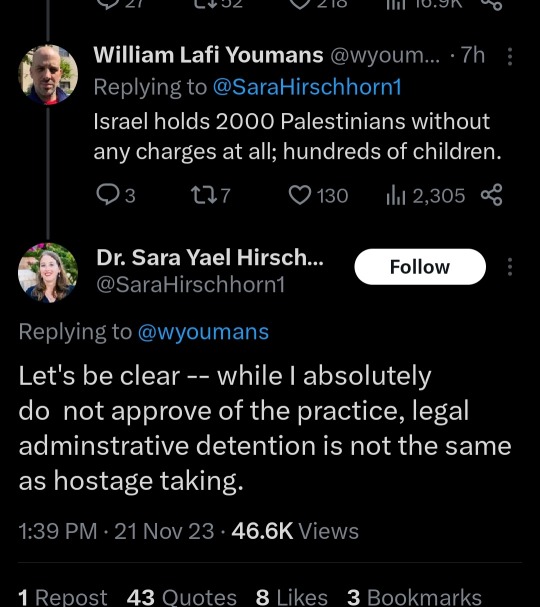
Like, she absolutely knows this action is morally wrong.
But it is “legal” which suddenly makes it okay.
Chilling.
1K notes
·
View notes
Text

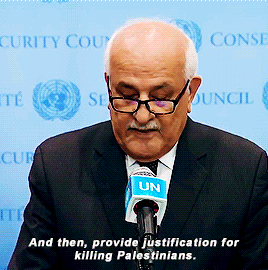

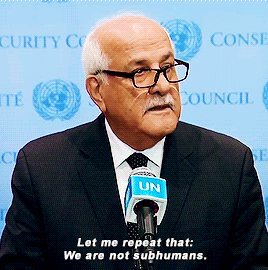
Where is the International protection the Palestinian people is entitled to when the occupying power violates international law and harms those it is obliged to protect. Aren't Palestinians lives worth saving?
-Riyad Mansour (Palestinian representative to the UN)
#so let me get this straight#when ukranians fought for freedom it was fine#but when palestine fights their colonizers...it's wrong?#the west being the west i guess#pro palestine#palestine#riyad mansour#anti israel#anti zionisim#mine*#gifs*
36K notes
·
View notes
Text
GLOBAL STRIKE ON APRIL 15
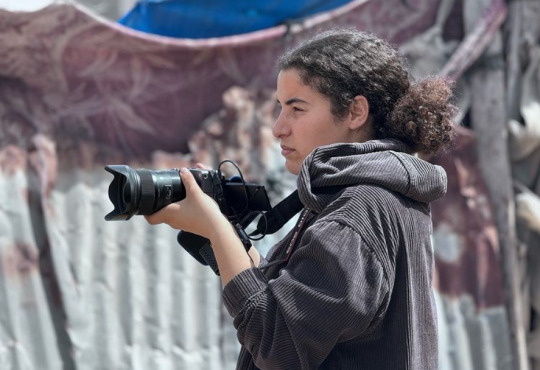
"The terrorist Israeli occupation, after half a year, is still insisting on entering Rafah, which is the last city that still contains most of the population of the Gaza Strip.
80% of the Gaza Strip is destroyed and suffers from continuous military invasions, the movement of the Israeli army, besieging hospitals, commit massacres, destroy and blow up residential neighborhoods. And besieging the population and starving them.
The terrorist occupation is committing these crimes in front of the world, and is trying to have more time to destroy the hopes of the displaced to return and kill them with hunger and disease, and make the world get used to what is happening in Gaza and reduce media coverage and solidarity with Palestine, in addition to causing more destruction and strengthening the presence of the Israeli terrorists in Gaza in preparation for stealing the land.
Be smarter than them, and do not leave us to be killed and forgotten. *April 15 is a day of global strike*.. No schools, no movement, no work, no electronic payment, no gas stations. Make more noise and disturb the peace of terrorist politicians in America and IsraHell.
In the picture, me after half a year of documenting the genocide and surviving it daily without being sure of surviving the next day, and I will not stop until this genocide ends and I sit in the middle of my city feeling safe while I help my people rebuild Gaza."
Here's what to do:
Don't go to school or work (if you can)
Protest (if you can)
Do not shop anywhere
Do not use your credit card or use any money
Wear green, red, white and black clothes to show solidarity. Wear a badge, a keffiyeh, or anything that signifies your solidarity
Boost posts about Palestine, flood the media
Boycott!
#gaza#free gaza#gaza strip#israel is a terrorist state#genocide#jerusalem#gazaunderattack#palestine#israel#free palestine#rafah#tel aviv#free free palestine#current events#news on gaza#yemen#save rafah#rafah under attack#all eyes on rafah#free rafah#khan younis#colonialism#colonization#west bank#israeli occupation#al shifa hospital#egypt#lebanon#united nations#United nations
11K notes
·
View notes
Text
Love is in the air 🖤🗡💀
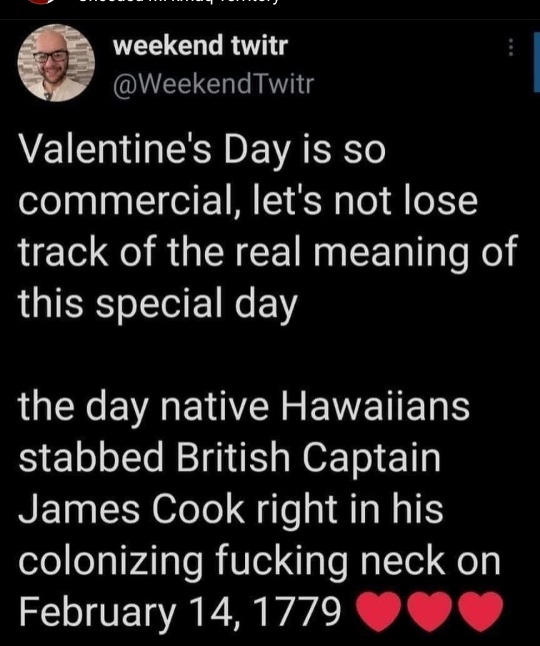
65K notes
·
View notes
Text
Your reminder to Click for Palestine today!
And/or donate directly to the UNRWA if you have the means!
#unrwa#unrwafunding#DonateToUNRWA#united nations relief and works agency for palestine refugees in the near east#end israeli occupation#colonialism#colonizers#make a difference in the world#how to make a difference#humanitarian assistance#humanitarianism#end israel’s genocide#israel#free west bank#donations#gaza genocide#reminder blog#help palestine#help gaza#anti zionism#israeli occupation#freedom for Palestine#free gaza#jerusalem#no more war#colonization#make a difference#how to help#humanitarian aid#humanitarian crisis
4K notes
·
View notes
Text

#nothing has changed#palestine 🇵🇸#palestine#gaza#israeli war crimes#israel occupation#colonization#settler colonialism#imperialism#current events#social justice#human rights#free gaza#gaza genocide#gaza strip#gazaunderattack#save gaza#stand with gaza#gazaunderfire#fuck israel#anti zionisim#israel is a terrorist state#boycott israel#west bank#middle east#genocide#ethnic cleansing#free palastine#free palestine#freepalastine🇵🇸
7K notes
·
View notes
Text


#death to america#death to israel#zionazis#iran#free lebanon#free syria#free yemen#free iraq#iran attack#palestinian genocide#israeli war crimes#us war crimes#genocide convention#racism#western imperialism#us imperialism#american imperialism#colonialism#colonization#global south#SWANA#middle east#knee of huss
2K notes
·
View notes
